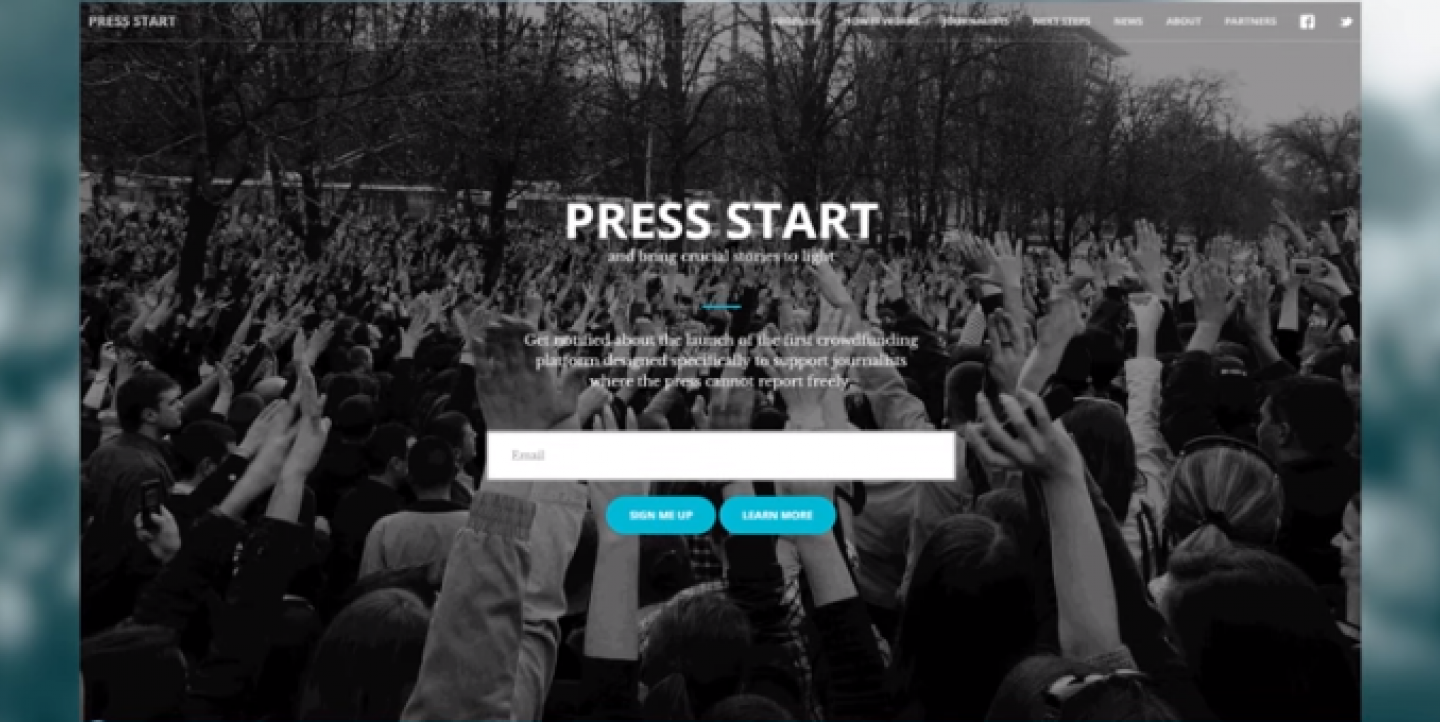With approximately 6 billion — or 86 percent — of the world’s people living in places that have suppressed press freedom, it’s clear that journalists face distinct challenges when trying to report the facts.
And simply training journalists to overcome these challenges can only go so far.
“You can train people as much as you want, but they still need money to feed their families and write the stories,” said Jeremy Druker, executive director and editor-in-chief of Transitions Online. “A lot of times, people go through this training, but once they return home, it’s difficult for them to implement it. Sometimes it’s because the gatekeepers are still there, but often it’s simply an issue of money.”
Sensing the need to connect journalists with people willing to fund their work, Druker and a group of media professionals founded Press Start, a platform for journalists to raise crowdfunded donations.
“We’re creating a market for them abroad which doesn’t exist at home,” Druker said. “For repression reasons or economic reasons, there’s not enough money or will locally to support quality journalism. Press Start is a market correction in that way. We’ll have to see if the international crowd pays to correct this local funding gap for this type of work.”
Druker outlined Press Start’s crowdfunding setup and how he hopes it will help improve press freedom worldwide:
Step 1: Identify journalists
To become a featured journalist on Press Start, one must be nominated by one of its partner organizations, such as the Belarusian Association of Journalists, IREX-Europe and Radio Free Europe/Radio Liberty. While many of these current partners are based in Eastern Europe, Druker explained that the platform will feature journalists from all over the world. Once nominated, journalists must go through a screening process, during which they’ll describe the topics they wish to cover and the type of content they’ll deliver after reaching their funding goal.
Currently, Press Start features journalists Volodymyr Torbich, Zaklina Hadzi-Zafirova, Ruslan Gorbachev and Habib Battah.
Step 2: Profile journalists
The next step is to create a profile for each journalist that will successfully elicit empathy in potential donors and make them want to donate to a campaign.
“That’s a challenge, and it has been a challenge I think we didn’t anticipate,” he said. “I think trying to individualize the profiles so you do get a feel for the person behind the journalist label will play a big role.”
Step 3: Donors fund the journalists
Once the journalist’s profile is complete, Press Start will launch a month-long crowdfunding campaign for his or her work, with a standard campaign goal of US$2,000. If this goal is reached, the journalist will be expected to produce 10 articles. If a reporter needs extra safety coverage to work in a hazardous environment, Press Start would allow for additional funds to be raised.
What happens if a journalist’s crowdfunding campaign doesn’t reach the US$2,000 goal? In most cases, he or she will still receive the money raised, but will produce a reduced number of articles, Druker said. These journalists will also get support from money raised through Press Start’s general fund.
Step 4: Journalists’ articles go live
If the funding goal is reached, the journalist will be expected to produce 10 articles over a four-month period. The majority of these articles will be written in the journalist’s own language for a local audience, but a select few will be translated to English and featured on Press Start’s site.
Once a journalist’s articles have been published, Press Start will have a way of informing donors about the success of these articles.
“What we’re planning to do is an impact assessment for each batch of articles that’s been funded,” Druker explained. “Not just that your donation made 10 articles happen, but what happened because those articles were published. Was awareness raised? Was there a policy debate? If these were investigations, did it uncover corruption? Did someone get thrown into jail? The journalists will have to answer that, and I think people will want to know that.”
If a journalist’s work was a success, he or she will be able to start another crowdfunding campaign for another cycle of articles. The end result, Druker said, is a measurably positive impact in countries whose press freedom has been compromised.
“In our view, there are people in all these countries who are standing up against this media oppression,” he said. “The idea is to identify them and get them the support and that hopefully gradually improves the situation for these societies.”
Main image is a screenshot of Press Start's homepage.

